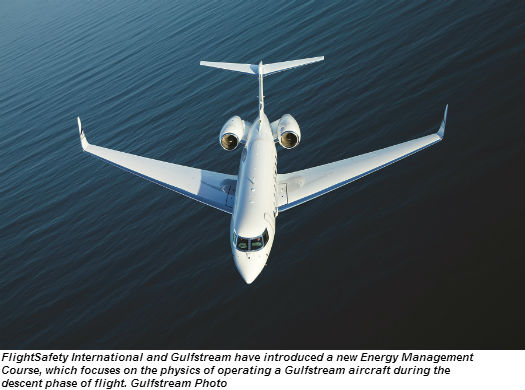FlightSafety Press Release | May 21, 2014
Estimated reading time 2 minutes, 52 seconds.
FlightSafety International and Gulfstream have made a number of recent announcements, including the introduction of a new Rejected Takeoff course. The course is designed to promote best practices and enhance Go/No-Go decision-making. The four-hour simulator-based course presents the flight crew with 18 different V1 scenarios, requiring a decision to either continue the takeoff or abort. This invaluable course gives two pilots an opportunity to fly under the high stress and demands of an emergency return. Each pilot will have the opportunity to practice multiple emergency return scenarios. The course is currently offered at FlightSafety’s Learning Centers in Dallas, Texas, and Savannah, Ga., and is expected at additional locations by the end of the year.
The two companies have also introduced a new Energy Management Course, which focuses on the physics of operating a Gulfstream aircraft during the descent phase of flight. The course includes two hours of ground school and four hours in a flight simulator.
As well, FlightSafety International has announced that its first FS1000 full flight simulator will enter service at the company’s Learning Center in Long Beach, Calif. Training using this new Gulfstream G650 simulator is scheduled to begin in July 2014. FlightSafety’s first two Gulfstream G650 simulators are located at the company’s centre in Savannah.
The training organization has also announced that its Gulfstream G550 program has been further enhanced through the use of the company’s new and innovative Operational Day Flow training methodology. In addition, FlightSafety’s Gulfstream G550 flight simulator located in Farnborough is being equipped with Controller-Pilot Data Link Communications (CPDLC) and the new VITAL 1100 visual system.
In addition to Gulfstream-related announcements, FlightSafety has also reported that it will install a new Dassault Falcon 2000LXS flight simulator at its Learning Center at the Paris- Le Bourget airport. This is in addition to the Falcon 2000EX EASy simulator already in place at that location. Training for the Falcon 2000LXS is expected to begin in September 2015.
Recently, FlightSafety’s Dassault Falcon 7X EASy II initial pilot training course was the first to receive Falcon Training Policy Manual certification. The Falcon Training Policy Manual is designed to ensure that Falcon Jet operators from around the world receive training in accordance with Dassault’s specifications for technical accuracy and content.

